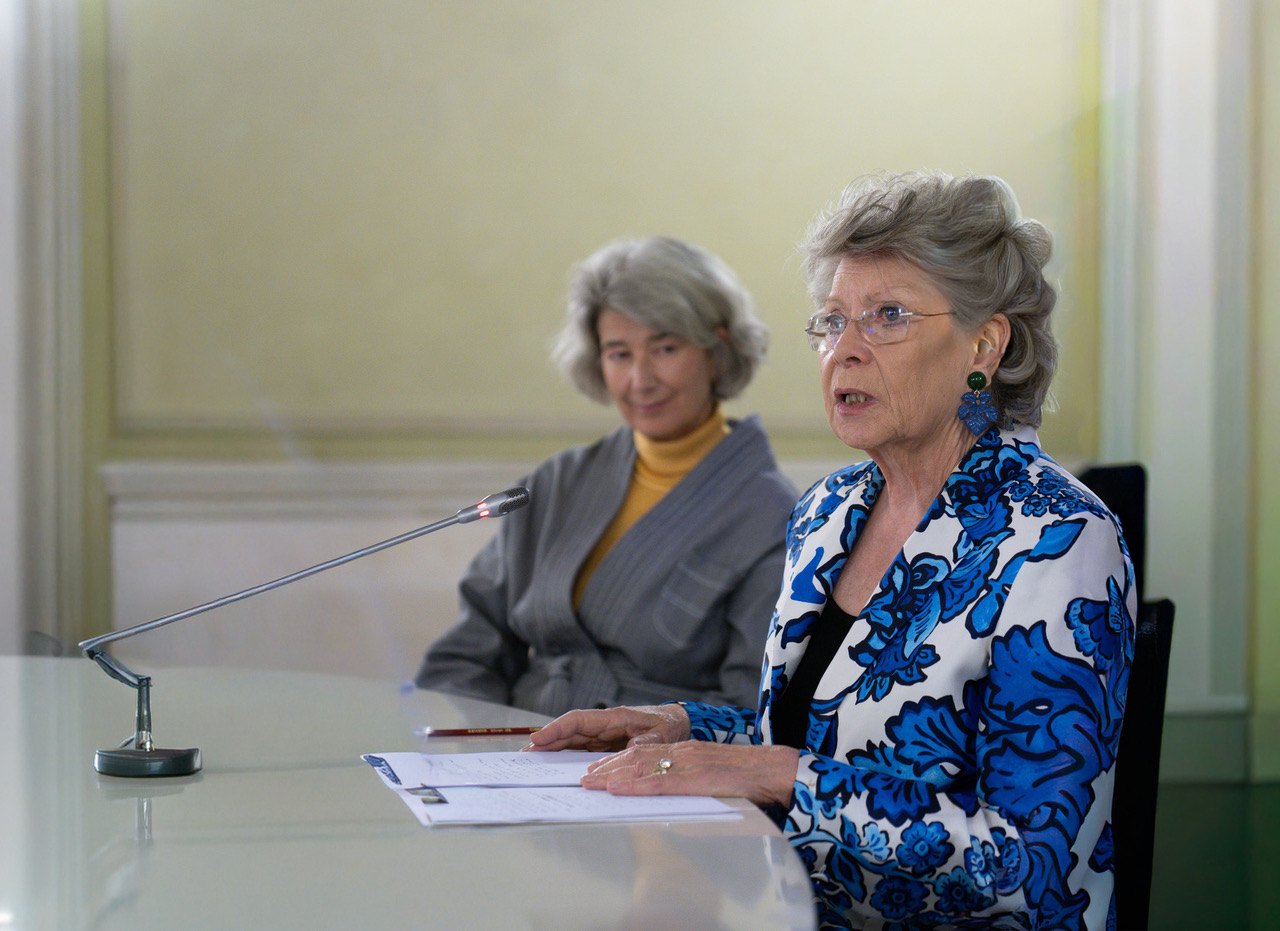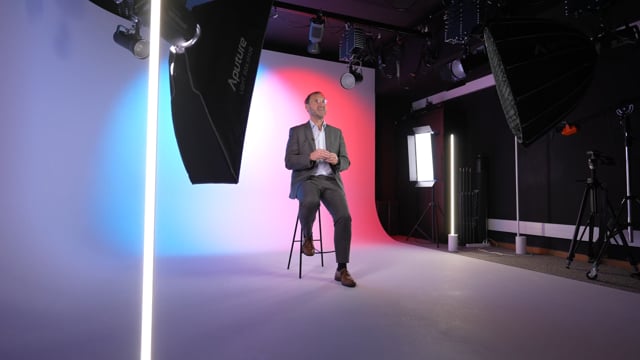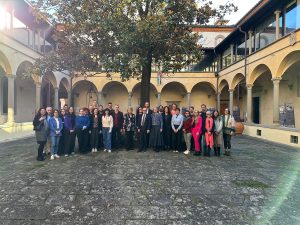Conference report
The conference ‘’Women and Europe – Interdisciplinary Approaches, Innovative Prospects, New Sources’’ held on 10-11 November 2025 at the European University Institute (EUI) in Florence, aimed to critically explore the often-overlooked role of women in Europe’s contemporary history.
The event was organized by the Luxembourg Centre for Contemporary and Digital History at the University of Luxembourg, the EUI, the Alcide de Gasperi Research Centre, the Historical Archives of the European Union, and the EUI Robert Schuman Centre, with support from the Robert Schuman Initiative for European Affairs at the University of Luxembourg.
Over the course of two days, 23 scholars, representing a range of disciplines and career stages from 16 universities and research organizations across Europe, engaged in a productive exchange through their presentations and keynotes, driving forward academic understanding, unveiling new projects, and offering critical insights into broader societal issues, all of which amplified the event’s impact, underpinned by the guidance and oversight of the members of a scientific committee members.1

After their interventions outlining the objectives and scope of the conference, a pre-recorded message from Prof. Simone Niclou (Vice-Rector for Research at the University of Luxembourg) was broadcast to the participants. She highlighted the synergies between the University of Luxembourg and the EUI in interdisciplinary research, particularly regarding the exploration of women’s roles and contributions to contemporary European history, through the creation of new sources and original perspectives.2
In this context, I will revisit the principal topics debated during the conference, emphasizing recent conceptual and analytical shifts, including the incorporation of a gender lens in the interdisciplinary study of European history, new insights into the reevaluation of women’s roles within this framework, the impact of digital transformation on research approaches, as well as the production, preservation, and analysis of sources—particularly those emerged via oral history—and the challenges related to knowledge sharing in light of the increasingly interconnected relationship between academia and society.
1. The Interconnectedness of Institutional Frameworks and Normative Influences
A recurring theme across the panels was the structural presence of women within European institutions. Tom Hillebrand (Friedrich-Ebert-Stiftung) explored the impact of Katharina Focke (1922–2016), demonstrating how her legislative initiatives reshaped European social policies. Mechthild Roos (University of Augsburg) examined Astrid Lulling as a cross-institutional norm entrepreneur whose work grounded Social Europe policies within the European institutional memory. Emmanuel Mourlon-Druol (EUI, Alcide De Gasperi Research Centre) addressed the methodological challenge of integrating gender into the history of Europe’s Economic and Monetary Union, urging scholars to critically engage with institutional records that often obscure women’s contributions. Chaired by Elena Danescu (C²DH, University of Luxembourg), this discussion framed women’s roles not as peripheral but as integral to the shaping of institutional and policy frameworks, showing how women have consistently navigated, influenced, and transformed these spaces through the contemporary history of Europe, especially in the early years of the European integration process.
Peter Hallama (Paris 1 Panthéon-Sorbonne University), in his opening keynote address chaired by Dieter Schlenker (Historical Archives of the European Union), expanded this analysis to international relation, emphasizing that gender is a structural dimension in diplomacy and transnational networks, challenging the male-dominated assumptions of traditional international relations historiography.
2. Reconceptualizing Knowledge Creation through Visibility and Representation
Another cross-cutting theme was the role of visibility and representation in designing and assessing women’s historical presence on the public stage. Anna McEwan (Leverhulme Trust) analyzed the Democratic Women’s League of Germany (1970–2000), showing how institutional and ideological constraints influenced feminist activism. In turn, Franziska Bachmann (University of Hamburg), Lilian Langer (Helmut Schmidt University Hamburg), and Verena Kahl (University of Hamburg/Europa-Kolleg Hamburg) demonstrated how an innovative collaborative project, carried out in partnership with students – a pocket calendar series – served as a tool for translating women’s legal contributions into public and archival visibility, facilitating their integration into the legal and political historical narrative. This debate, chaired by Myriam Piguet (C²DH, University of Luxembourg), illustrated that visibility is not merely descriptive; it is constitutive, determining which actors and interventions are legible to historical scholarship. The discussion bridged institutional, media, and archival practices, emphasizing that representation and memory are actively shaped by the ways in which sources and narratives are constructed.
3. European Voices Bridging History and Scholarship Viviane Reding at the 2025 Ursula Hirschmann Lecture
In historical scholarship, testimonies from individuals who have witnessed or taken part in key European events are invaluable for interpreting historical developments and situating them within broader contexts. These first-hand accounts, central to oral history as a methodology for generating new sources, illuminate pivotal processes, offer nuanced analytical perspectives, and enable historians to critically evaluate both the significance of events and their wider impact on European history. The 2025 Ursula Hirschmann Lecture3 – jointly organised by the Robert Schuman Centre for Advanced Studies, the EUI Department of History and the University of Luxembourg -, exemplified this principle.
Delivered by Viviane Reding4 (Luxembourg), a prominent European leader, her intervention titled “Women in the EU: breaking barriers, building futures” traced the trajectory of women in the European Union, drawing on her personal experiences to reflect on the progress achieved, the barriers overcome, and the challenges that remain in advancing gender equality. She highlighted the fragility of these gains amid contemporary political pressures and underscored the importance of safeguarding the historical memory of women’s activism.

© EUI
The 2025 Ursula Hirschmann Lecture, chaired by Benno Gammerl (EUI, Robert Schuman Centre for Advanced Studies, Chair for History of Gender and Sexuality), was inaugurated with a welcome address by Prof. Patrizia Nanz (President of the EUI), followed by a pre-recorded message from Prof. Jens Kreisel (Rector of the University of Luxembourg). The Rector highlighted three key points: first, the University’s partnership with the EUI is advancing European integration studies through interdisciplinarity, broadening the research agenda via innovation and fostering research training; second, the C²DH is at the forefront of integrating digital archives, oral history, and AI tools to provide fresh insights into Europe’s past, with a focus on ethical and, interdisciplinary scholarship; and third, the incorporation of gender perspectives is essential for a more complete and just history, highlighting the significant roles of women in politics, culture, and diplomacy.

4. Revisiting Women’s Transnational Memory through Digital Approaches
The debate on transnational memory and digital history focused on how digital approaches and tools in the context of cross-border networks are reshaping the historical record. Chaired by Khushi Singh Rathore (a Max Weber Fellow at EUI) this discussion featured several presentations that explored the potential and challenges of using digital methodologies to create a more inclusive transnational memory. Simona Guerra (University of Surrey) discussed the complexities of constructing a transnational memory of women’s activism, highlighting the difficulties in bridging national boundaries and preserving these histories within digital archives. In the same line, Carlos López Gómez (Universidad Antonio de Nebrija) examined the European Movement in Spain (1981–1985) as a key platform for feminist mobilization, illustrating how digital tools enable the connection of local struggles to broader transnational feminist agendas.
Laurence Badel (Paris 1 Panthéon-Sorbonne University) addressed, in her closing keynote address chaired by Glenda Sluga (EUI, Robert Schuman Centre for Advanced Studies), the challenges of writing a comparative history of women’s entry into diplomacy, emphasizing the significant influence of national institutional cultures and archival limitations on women’s diplomatic careers, while also suggesting how digital archives and newly created oral history sources can overcome some of these barriers by providing access to previously inaccessible sources.
5. Marginalized Experiences in Shaping (Legal) Education
Marginalized voices were central to the panels on law, pedagogy, and gendered experiences, highlighting the structural and relational dimensions of women’s marginalization and influence within European governance. Chaired by Benno Gammerl (EUI, RSCS), the debate emphasized the ways in which these voices reveal hidden inequalities, shape institutional practices, and inform strategies for reform in governance, law, and pedagogy. In this context, Nadiya Kiss (University of Erfurt) examined the solidarity networks among displaced Ukrainian women academics, showing how female academic solidarity – qualified as “sorority” – works as an infrastructure for preserving expertise and maintaining institutional continuity. Lidia Ballesta (Universitat Autònoma de Barcelona) addressed gender mainstreaming in legal education, emphasizing, through a specific case study, how pedagogical interventions can drive institutional transformation.
Simon Godard (Grenoble Institute of Political Studies) chaired the debates focused on the European Parliament’s contributions to advancing women’s rights, as well as the role of women in shaping international and European legal frameworks. In this context, Étienne Deschamps (Archives of the European Parliament, Luxembourg) explored the European Parliament’s key legislative initiatives aimed at promoting gender equality and safeguarding women’s rights. In their co-written paper, Laura Rahm (EUI) and Valentina Vadi (University of Padua) examined the complex contributions of women in international economic law as subjects, objects, and agents of norm creation.
6. Final Thoughts: Entangling Integrative Insights and Methodological Innovations
The closing roundtable of the conference, led by Elena Danescu (C²DH) and Emmanuel Mourlon-Druol (EUI), synthesized the key cross-cutting insights from the exchanges, underscoring three pivotal themes:
- Gender as a Structural Lens: Gender must be incorporated as a central analytical framework across research design, pedagogy, and institutional analysis, enabling a deeper understanding of the relational and structural dynamics that shape both historical events and social systems.
- Transnational, Comparative, and Interdisciplinary Approaches: Methodologically diverse, a cross-border perspective on research is crucial for identifying the structural patterns of women’s involvement in European history, revealing both the interconnectedness and the differences, specificities and particularities of historical processes across national borders.
- Expanded Source Ecologies: Oral histories, private archives, and digital repositories are essential for recovering the voices of marginalized actors and networks, offering a more inclusive and nuanced view of history.
Taken together, these insights reshaped our understanding of women’s historical contributions, emphasizing that they have been not only agents of change but also key architects of the political, legal, and intellectual frameworks that have shaped Europe.
The contributions further underscored how transnational perspectives and innovative (digital) methodologies, as transformative tools of knowledge production, expand both the scope of historical understanding and the ways in which we conceptualize, narrate, and analyze women’s roles in shaping contemporary society.
The proceedings of the conference, showcasing a collection of selected papers, will be published in 2026 by the academic publisher De Gruyter – Brill.
Author(s)
1) Composition of the Scientific Committee (in alphabetical order): Elena Danescu (Luxembourg Centre for Contemporary and Digital History), Benno Gammerl (EUI, Chair for History of Gender and Sexuality), Emmanuel Mourlon-Druol (EUI, Alcide De Gasperi Research Centre), Dieter Schlenker (Historical Archives of the European Union), Glenda Sluga (EUI, Robert Schuman Centre for Advanced Studies)
2) The Conference is organized within the framework of the research projects “The Role of Women in European and International Relations in Luxembourg’’ (after the Second World War) (University of Luxembourg, C²DH) and “The female face of the EU: hidden histories, transnational dynamics, new approaches” (HER-EUROPE) (C²DH, EUI/Robert Schuman Centre for Advanced Studies 2024-2025).
3) The annual Ursula Hirschmann Lecture series was started at the EUI in 2001. It is named after Ursula Hirschmann, anti-fascist, feminist, European visionary, and founder of the Brussels group Femmes pour l’Europe, a movement to promote gender equality.
4) Over her decades-long career as a European leader, Viviane Reding served multiple terms as a Member of the Luxembourg Chamber of Deputies and the European Parliament (1989-1999 and 2014-2018) and three consecutive mandates as European Commissioner (1999-2014). As European Commissioner for Education and Culture (1999-2004), she initiated, among other major projects, the Erasmus World Programme. As Commissioner for Information Society and Media (2004-2010), she paved the way for a digital Europe, achieving a 70% reduction in mobile roaming charges. As the first Vice-President of the European Commission in the Barroso II Commission (2010-2014), Viviane Reding shaped EU policy on justice, fundamental rights, and citizenship, championing equality, the rule of law, and stronger protections for women, minorities, and people with disabilities, as well as a common European sales law and the reform of the EU data protection rules. Across her professional and political trajectory, she advanced landmark initiatives srecognised for her unwavering commitment to justice, democracy, and human rights, Dr Reding has been a driving force in shaping a European area of justice that is more inclusive, equal and citizen-focused. Source: https://www.eui.eu/events?id=577325

